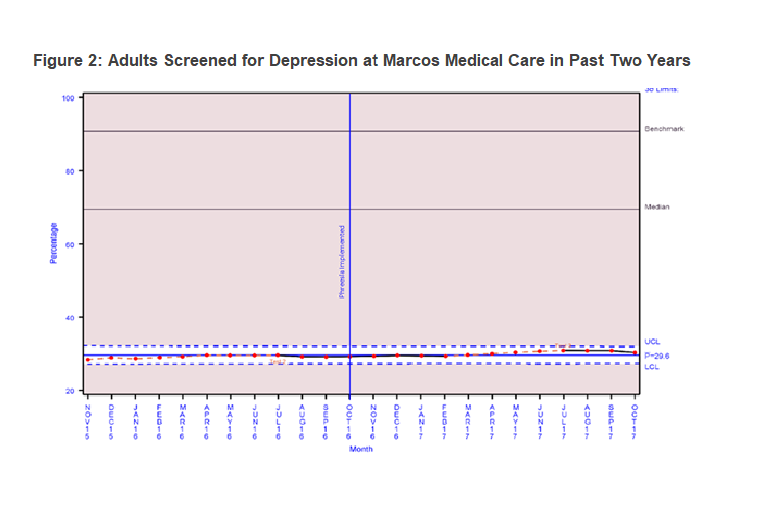
The Centers for Medicare & Medicaid Services (CMS) offers two types of visits covered by Medicare: The Welcome to Medicare preventive visit and an Annual Wellness Visit. During these visits, primary care physicians develop and update a personalized prevention health plan based on a patient’s health and risk factors determined from a Health Risk Assessment (HRA). As part of the HRA, patients and providers review various behavioral health risks, including mental health and alcohol use.1
The TMF Quality Innovation Network Quality Improvement Organization (QIN-QIO), under contract with CMS, offers assistance to physicians in Arkansas, Missouri, Oklahoma, Texas and Puerto Rico with screening for depression and alcohol use disorder under its Behavioral Health initiative. Yolanda Marcos, MD, a primary care physician specializing in Internal Medicine at Marcos Medical Care in San Antonio, Texas, is a participant in the Behavioral Health initiative. Dr. Marcos, her nurses and her medical assistants received technical assistance from a TMF QIN-QIO consultant to become familiar with alcohol and depression screening. Dr. Marcos’ patient visits are spread out throughout the year, allowing her and her team time to conduct a thorough physical that includes screening for behavioral health. Completing the Medicare Annual Wellness Visit has helped the practice do a better job at capturing depression and alcohol-related issues.
Dr. Marcos attests, “[TMF QIN-QIO] giving validity for these screenings and education to the staff was extremely helpful.” Despite her staff already being familiar with screening tools, working with an outside organization like the TMF QIN-QIO only validated the need to screen these patients to effectively provide quality care.
Dr. Marcos also contributed her high screening rates to an application called Phreesia, which sends an email to patients with a set of questions to be answered before their visit. If the patient does not fill out the questions ahead of time, front desk staff gives them a tablet to use in the waiting room. The questions the patients receive are tailored to their specific type of appointment. Patients that are scheduled for their Medicare Annual Wellness Visit will receive the depression and alcohol screening as part of this process, and the questionnaire is automatically uploaded to patient charts upon completion. The medical assistant then reviews the score and enters it into the visit notes for the provider to review with the patients. This workflow helps patients complete the screening questions efficiently, leaving more time for other topics during the visit.
Dr. Marcos has made it her goal to screen patients consistently. Completing the screening is one small part of the process, so she has her team continually assess and modify the workflow to increase the number of screenings across patient populations. Dr. Marcos takes the prevalence of behavioral health disorders seriously, so she aims to improve the quality of care she delivers, regardless if patients are visiting for a Medicare Annual Wellness Visit or not, and address conditions before they escalate. Perhaps the most positive outcome Dr. Marcos has seen from her screenings is that patients have to take charge in order to complete their own screeners. Since Marcos Medical Care has embraced these behavioral health screenings within the practice, the practice has maximized treating the whole health needs of their patients, recognizing that behavioral health and physical health are interrelated.
The graphs below demonstrate the screening rates over two years of Marcos Medical Care’s 3,506 patients among all payer types, including self-pay. Dr. Marcos implemented Phreesia around October of 2016.

